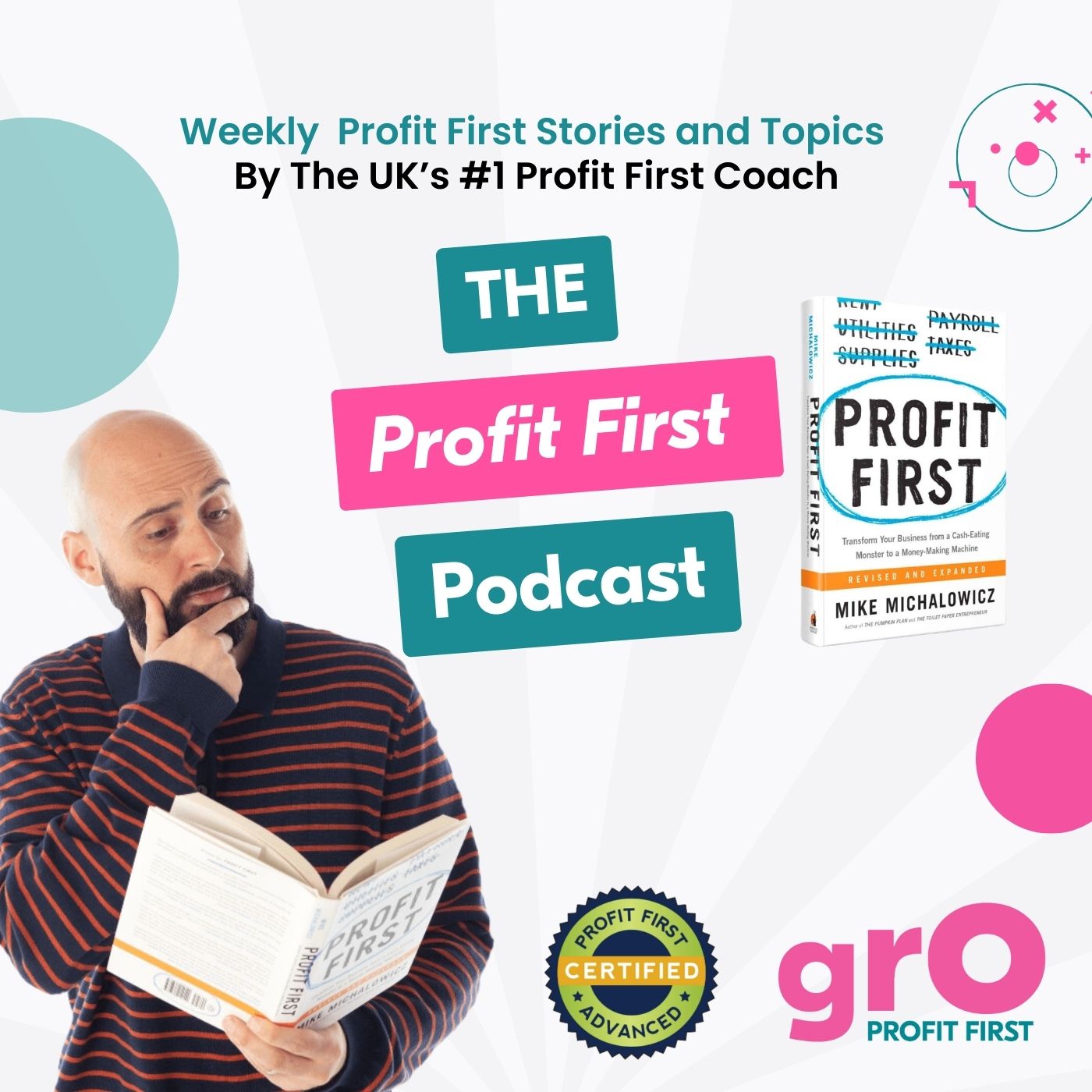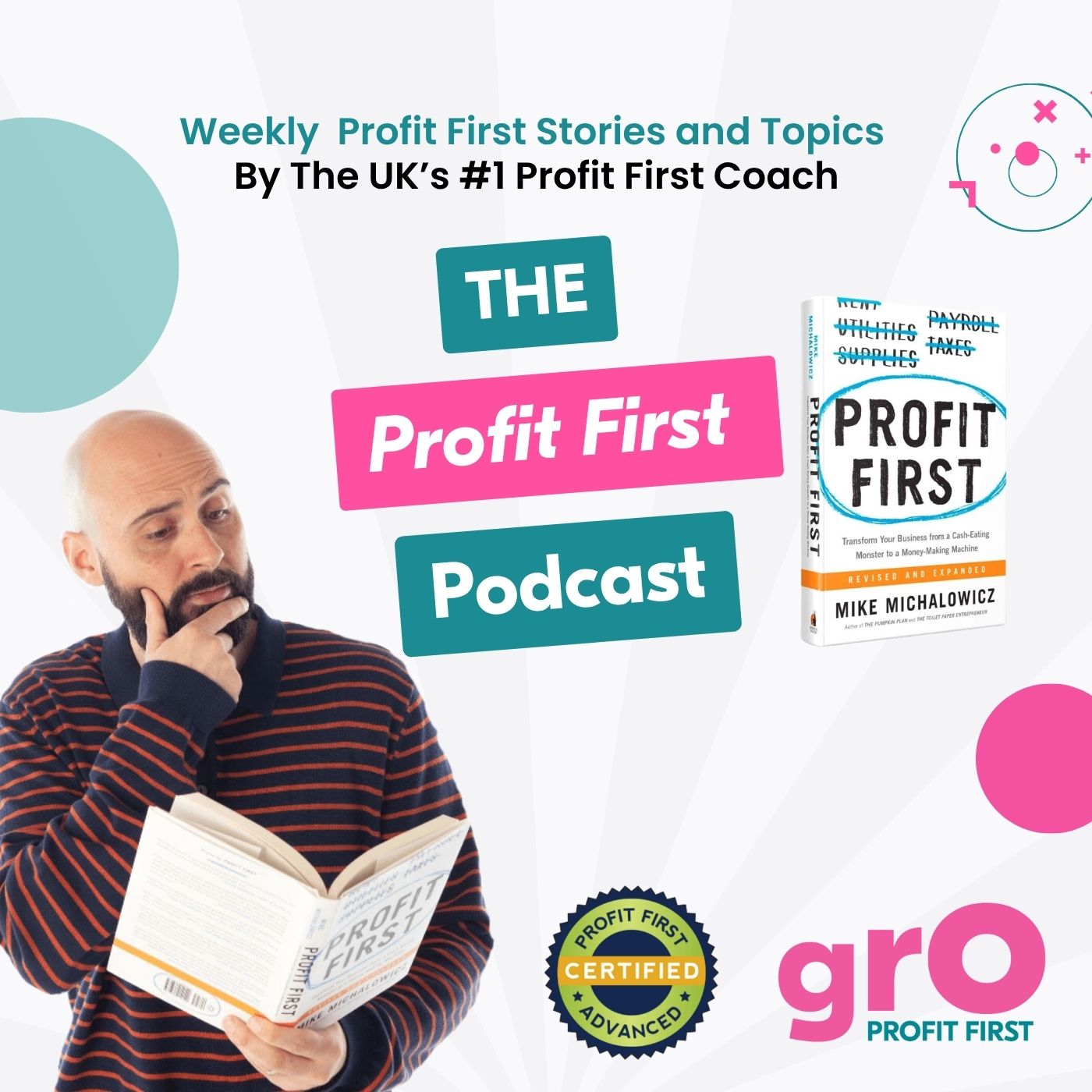Episode Transcript
[00:00:01] Hi guys, it's Stephen Edwards from Grow Profit first and welcome to the Profit first podcast. So I want to talk about two subjects today, so if you've been following the Profit first podcast, you will know a little bit about me. So I run an accounting practice based in the UK called Grow Profit First Accountants. We're Profit first certified accountants, and essentially we help people implement Profit First. So on this podcast I share tips and tricks, strategies, case studies, experiences around Profit first, but also I believe Profit first is just one part of the puzzle, really. Ultimately, we're all looking to build a more profitable business, one that gives us the lifestyle, the income, the peace of mind that we want as owners for ourselves and our family. So I will be sharing insights around how can you grow your business as well, which is why we rebranded from CTA to Grow Profit First Accountants, because we want to help you essentially grow your business and grow your profits. So we all kind of grow in together, as kind of cheesy as that sounds. So the first thing I'm going to dive into is not to do with Profit First. It's going to be around your weekly planning, because I think this is so important for the results you get in your business and your life. Secondly, I'm going to talk about what happens when you fall off the bandwagon with Profit first, or actually anything else for that matter, in your business, in your life, but specifically with Profit first, and how do you get back on it and get those results again?
[00:01:42] So weekly planning, you've probably tried different systems, different bits of software, maybe even read some books. So my weekly planning machine is based off 10 years of my experience.
[00:01:55] So I've got a one page summary. So if you go into Beehive Profit First Club, you will see the visual for this. So essentially, what is the aim of weekly a weekly planning machine, what we trying to achieve, so for me personally is to work on the most important things for the week that tie into the bigger goals, the rocks and the projects, to honor the calendar commitments that serve me and to say no to those that don't. So the idea here is you've got intention with what are you trying to achieve in your business. So you should have goals, you should have projects, you should have these big things you're working towards that can help you then focus on the tasks on a weekly basis. They're going to get you those results. If you don't have a business plan, you don't have goals, you don't have rocks, you're going to be a little bit like A rudderless boat, really, with nowhere to go. So it's really important you have a bigger picture. Once you've got that in mind, this system will help you focus on the most important thing. I've tried to do this. I've tried, you know, the urgent and important matrix. I've tried gtd, I've tried Kanban boards, I've tried everything you can think of all the different apps. I love apps. I have resorted to pen and paper, albeit a remarkable, which is a digital pen and paper path, essentially because it works. So I'm going to share with you what works for me. So first thing is you need to review last week. If you don't review last week, you, you don't know what to change. Einstein said the definition of insanity is doing the same thing, expecting different results. So we want to look at what went well, what didn't go so well, what can we improve? That really gives us a nice kind of starting point for the new week. We also want to focus on our wins. What went wow, what achievements, what where can we tap ourselves on the back, a little bit of gratitude for ourselves and acknowledge the progress we're making rather than just always focusing on the next thing to do on our list and that should be personal and business. That's number two. Number three, review your projects. Your project should link into your goals and your rocks. These are the big initiatives that are going to move you forward. So really everything you're working on should be linked to a project and a project should be linked to a goal in your business. So for example, if you want to increase Your revenue by 50%, which is a goal, a project might be to introduce a new service to your customer base. So that is the project. And then what are the to do's that link into that project you can focus on this week. Once you've done, you've reviewed your project, you can draft the priorities for the week. One piece of paper in any order. Just do a brain dump. Include the meetings, the commitments, any admin type stuff. You need to sort out personal as well, because it's all kind of wrapped in for business owners want to get off your brain all onto one page. However, not everything is equal. So what we want to do is we want to do a 20 80, 20 review. You know, I love the Pareto principle, absolutely one of the most important fundamental principles in life and business. It's not everything we do is equal or has equal results.
[00:05:02] It's more than likely that 20% of what you do is giving you 80% of your results or it's closer to that than it is 50. 50. So what are the 20% of the things on that list you drafted on one piece of paper that are going to give you 80% of your results for the week? That in itself should be a game changer. If you had 50 things on your list, you've now only got 10. What are the 10 things on the list that are going to give you the results for the week? Doesn't mean the other 50 not important. But we want to prioritize that top 10 and then we create our final list, which is in order it that way we always have the most important thing to work on next. I've tried time blocking, time boxing, whatever you want to call it, and it's great. It works for a lot of people. The problem is if you miss that slot and something happens, you get stuck into an emergency, you have to kind of rearrange everything or you have to put it back into next week because you've time boxed yourself out, you've got no more slots, you've got to move it to next week. The beauty with having a list of the most important things for the week in order that's been informed from your projects and your goals is you can always work on the most important thing next. You don't have to pull it off till next week. So for me, this. And you can obviously put some stuff in your calendar if you want to. And the next thing is you need to really have a daily list. So your weekly list should help you plan your day. And you want to plan it at least the day before because things can move. And here's a little kind of pro tip to make you feel good. Tick it off. You feel good when you take things off. You feel like you're achieving something. You're focusing on what you did get done, not what you didn't get done. So that is my weekly planning machine. And I now want to talk about falling off the bandwagon. So firstly, there's a big mindset about this. As business owners and in life in general, we are always going to have challenges, we're always going to have obstacles. We are going to fall off the bandwagon in many things in our life because life is not simple. Business is not simple. If it was easy, everybody would be doing it. So you will have obstacles, you will have setbacks. What I don't want you to do is have the mindset that it's always me. You know, what's the point? It's two steps back, one step forward. I'm just, I can never do anything right. I want you to embrace the struggle, embrace the obstacle. I shared in the recent podcast newsletters. The obstacle is the way is a mindset is actually take. Tackling your obstacles head on is what's going to give you the biggest results most of the time not chasing the shiny new object. So it's normal to have struggles and if we compare it to going to the gym, you know, over Christmas, people might fall off the bandwagon, put on some weight, overeat, but the people that are in it for the long term, that know it's a long game, they get back on the bandwagon in January and they start small. They just start with maybe a couple of 20 minute sessions for the week.
[00:08:05] What you don't want to do is say, oh my God, I put on a few pounds, I'm going to give up the gym. It's not for me. So in this case I'm going to give up profit first. It's not for me. What I want you to do is get back on the bandwagon, start small, start putting 1% aside again, just get in that habit. It's all about habits, the success we have it in our business. Your habits are either empowering you or disempowering you. So they're rather positive or negative. Some of them might be neutral, but you want to start reinforcing and building that habit. Even if it's starting small. What's really going to help you is having a plan. So if we think of people come back to the gym, if they've got a plan and a routine, they know they've got something to follow, that they don't need to overthink it. They've got a plan. The same applies with Profit First. If you've got a plan and a strategy, you are far more likely to get back on the bandwagon. Whether it's an accountability coach, it's a friend you work with, whether it's your own plan, whether it's someone who's holding you accountable like a personal trainer, which is what we do with our clients. We make sure they get the results and we actually create the plan for them. Whatever works for you, having some kind of planning strategy is going to give, is going to help you get back on the on the bandwagon, so to speak. And you know, I've if you're watching the newsletter, reading the newsletter online, as I said, it's on Beehive, the Profit first club. I've got a picture of Dwayne Johnson, the Rock on there with loads of junk food, pizzas, burgers. You know, he's. He's infamous for his cheat days. He's obviously in great physical shape, but even the Rock has a cheat day. So don't kick yourself when you don't do it perfect. We're not doing it 100%. It's all about consistency and what you do most weeks, most days, most months, that's going to get those results. Thanks, guys, and speak to you soon.


